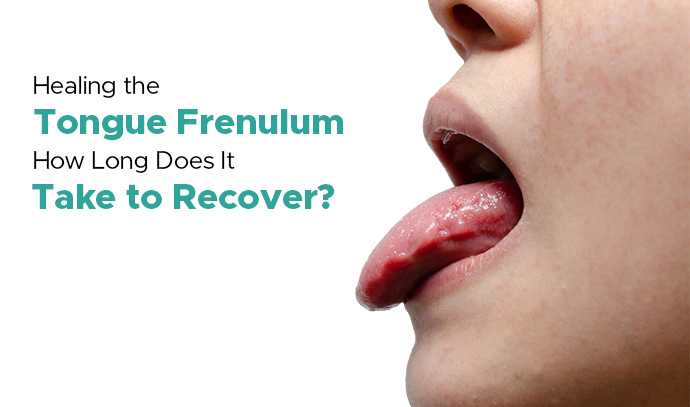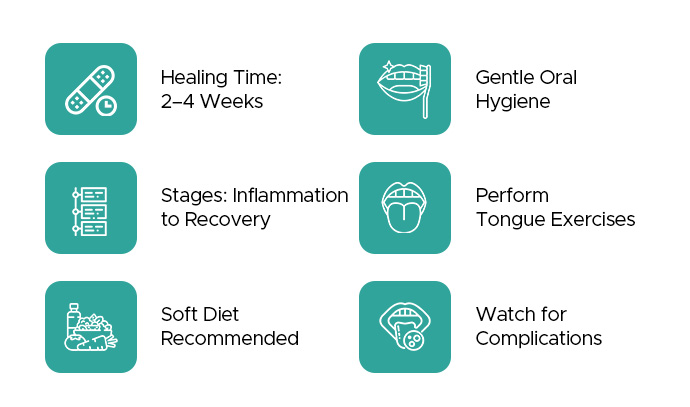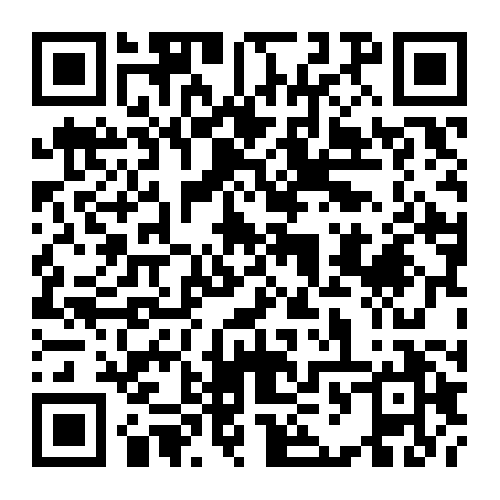
Healing the Tongue Frenulum: How Long Does It Take to Recover?
The tongue frenulum is a small tissue band beneath the tongue that supports movement and speech. A sore or injured tongue frenulum can be surprisingly uncomfortable. Whether due to accidental biting, trauma, irritation from braces, dental appliances or sharp foods, oral habits, or a surgical procedure like a frenectomy, healing the tongue frenulum can take time, care, and patience.
So, how long does it take to recover? Typically, healing from tongue frenulum takes about 1 to 2 weeks for minor injuries and 2 to 4 weeks post-surgery. But healing can vary based on your oral health, age, and aftercare practices.
If you’re looking to understand how to recover tongue frenulum properly and what to expect during the healing journey, read the sections below. We break down the stages, timeline, and essential aftercare steps to guide you toward a smoother recovery.
Tongue Frenulum Healing Time: What to Expect
Wondering how long it takes to recover from tongue frenulum. Here are the clear answers!
| Stage | Time Frame | What Happens |
|---|---|---|
| Inflammation | Day 1–3 | Redness, swelling, and sensitivity |
| Tissue Formation | Day 3–7 | New tissue begins forming |
| Strengthening Phase | Week 2–3 | Tissue strengthens, mobility improves |
| Full Recovery | Week 3–4 | Minimal discomfort, full tissue regeneration |
Each stage should show continuous improvement. If progress halts or reverses, it could be an indicator of poor aftercare, infection, or abnormal tissue growth.
1. Healing from Minor Injury or Tear
- Recovery Time: 5 to 10 days.
- Symptoms: Soreness, swelling, or a small cut.
- Care Tips: Rinsing with warm salt water, avoiding spicy or hot foods.
Minor injuries often go unnoticed until they begin causing pain during eating or speaking. If detected early and treated conservatively, they usually resolve without medical intervention. However, deep or recurring injuries may require clinical assessment to rule out underlying conditions.
2. Healing from Frenectomy Procedure
- Recovery Time: 2 to 4 weeks (varies based on technique: scalpel, laser, or scissors).
- Initial Healing: 3 to 5 days with visible improvement.
- Complete Tissue Regeneration: Up to 4 weeks.
A frenectomy is a quick outpatient procedure, but recovery must be handled thoughtfully. Proper healing ensures the tongue regains its full range of motion and avoids scar formation that can re-restrict movement.

Factors That Affect Tongue Frenulum Healing Time
Tongue frenulum healing time varies from person to person. Here are the list of factors affecting the same –
1. Age and General Health
Children and young adults typically heal faster due to robust tissue regeneration. Elderly patients or individuals with systemic issues such as diabetes may experience slower healing.
2. Type of Procedure or Injury
The use of a laser in frenectomy offers a cleaner cut and less bleeding, which usually results in quicker recovery. In contrast, traditional scissors or scalpel techniques may cause more discomfort and longer healing duration.
3. Oral Hygiene Practices
Post-procedure care is critical. Daily rinsing with antiseptic solutions or saline water reduces infection risk, especially during the first week. Neglect can lead to swelling, pus formation, or even delayed wound healing.
4. Nutritional Support
Proper diet post-injury accelerates recovery. Nutrients that play a key role include:
- Vitamin C: Boosts collagen production and immunity.
- Zinc: Supports cell repair and reduces inflammation.
- Protein: Rebuilds damaged tissue.
- Iron: Aids oxygen delivery to healing tissues.
Avoiding sugary and acidic foods is equally important as these can hinder healing or increase the risk of secondary infections.
How to Recover Tongue Frenulum: Best Practices
Recovering from a frenectomy or tongue frenulum injury isn’t just about rest — it’s about active care. Follow these expert tips for faster healing and long-term recovery:
Immediate Post-Injury or Post-Procedure Care
- Cold compress: Place under the chin for 10-15 minutes to reduce swelling.
- Pain relief: Use doctor-recommended painkillers if necessary.
- Soft diet: Stick to mashed potatoes, smoothies, soups, and yogurt for the first few days.
- Gentle cleaning: Avoid aggressive brushing. Use antiseptic mouthwash if prescribed.
Tongue Mobility Exercises
After a frenectomy, targeted exercises ensure the tongue regains full function. These exercises should be practiced 2-3 times a day:
- Tongue Elevation: Touch the roof of your mouth with the tip of your tongue.
- Side Glides: Move tongue side to side touching the upper molars.
- Resistance Pushes: Push the tongue against a depressor or clean finger.
These may seem minor but significantly influence speech development, especially in children. Lack of exercise can lead to reattachment or scar-induced limitations.
Long-Term Care
Long after the initial healing, maintenance is crucial to ensure no re-injury or recurring inflammation. Tips include:
- Routine dental checkups: Early identification of abnormalities.
- Hydration: Dryness can impede oral healing. Drink plenty of water daily.
- Lifestyle choices: Avoid smoking or chewing tobacco, both of which delay healing.
- Speech therapy: If tongue function remains compromised, especially in children, consider therapy for proper articulation.
Signs of Complications During Tongue Frenulum Recovery to Watch For
Even with appropriate care, healing may not always follow a straight path. Warning signs include:
- Persistent pain beyond 10 days.
- Bleeding or oozing from the wound site.
- Swelling that worsens after day 3.
- White or yellow discharge indicating possible infection.
- Difficulty swallowing or speech deterioration.
In such cases, it’s important to immediately consult a certified dental clinic in Calicut or a dental clinic in Kochi for a proper evaluation. Professional intervention ensures timely treatment before the complication escalates.
The Importance of Professional Follow-Up
Recovery is not just about time. It’s about the quality of healing. Follow-up appointments serve multiple purposes:
- Monitoring tissue growth and detecting irregularities.
- Evaluating tongue mobility and speech clarity.
- Ensuring exercises are being done properly.
- Preventing future reattachments or scar limitations.
A trusted dental provider can also make adjustments to your care plan. Elite Dental Studio provides holistic recovery support after surgical or accidental injuries involving the frenulum. Their personalized attention to post-treatment follow-ups ensures patients regain complete oral functionality.
Book Your Appointment Now!
Healing the tongue frenulum is a multi-phase journey. Whether it’s a minor injury or a surgical correction like frenectomy, the healing process demands patience, proper hygiene, and commitment to aftercare routines. While many cases recover in a few weeks, neglecting signs or skipping exercises can delay healing or lead to relapse.
Consulting professionals early ensures a seamless recovery. Clinics like Elite Dental Studio bring a compassionate and expert approach to oral surgeries and recovery support, guiding patients through every phase with personalized care.
If you’re in discomfort or uncertain about your tongue’s frenulum healing progress, don’t wait.
Book Your Appointment with our expert dentists in Kochi, Calicut or Kannur now!
Frequently Asked Questions
How long does it take for the tongue frenulum to heal after a frenectomy?
Ans. Recovery typically takes 2 to 4 weeks, depending on the surgical technique and post-care routine.
Can a torn tongue frenulum heal on its own?
Ans. Yes, minor tears usually heal within 5 to 10 days without medical intervention, but deeper injuries may require professional care.
What foods should I avoid during the healing process?
Ans. Avoid spicy, acidic, crunchy, and hot foods for at least 5 days post-injury or surgery.
Do I need to perform exercises after a frenectomy?
Ans. Yes, tongue mobility exercises are essential to prevent scar tissue and restore full range of motion.
Is swelling normal after frenulum surgery?
Ans. Mild swelling and soreness are normal for the first 2–3 days. Persistent or worsening symptoms should be evaluated by a dentist.
Have Dental Problem : Call us
CALICUT: +91 9745 072 555,
KOCHI: +91 9567 124 888
KANNUR: +91 9645874777
or make an Appointment
Take a smiling selfie and we'll Simulate your new smile See What Invisalign treatment could do for you!




